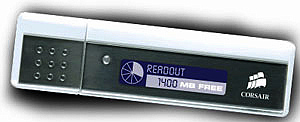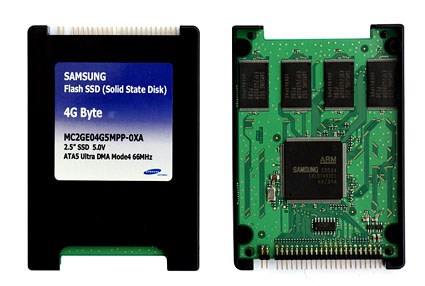Corsair Launches Flash Readout USB Drive With Bi-stable Cholesteric Display
Samsung Introduces 4GB Solid State Disk
Corsair Launches Flash Readout USB Drive With Bi-stable Cholesteric Display
Corsair Memory announced the introduction of the Corsair Flash Readout USB drive. The new USB Flash drive features a Bi-stable Cholesteric Display (BCD) showing data usage, availability and allowing for personalized ID or labeling.
Offering up to 2GB of storage, the new USB Flash drive features an 11 character alphanumeric label display, pie chart to indicate disk space usage and a 4-digit display showing available storage space. The BCD display retains and displays information for up to one year without the use of a battery.
In addition to advanced display features the Corsair Flash Readout USB drive offers sustained read speed up to 20MB/sec and write speed up to 7MB/sec. The drive supports Plug & Play functionality in Windows XP, 2000, ME, Linux 2.4.0 and later, Mac OS 9, X and later.
Product specifications:
- Display: 11 characters of personalized ID or label, 4-digit detail free space in megabytes, pie chart for indicating
disk space usage
- Capacities: 1GB and 2GB capacities available
- Interface: High Speed USB 2.0 (compatible USB 1.1)
- Speed: Up to 20MB/sec read and up to 7MB/sec write
- Indicator: LED indicator light
- Dimensions: 78 x 21 x 12.9mm (L x W x H)
- Accessories: Lanyard, setup CD and USB cable
- Warranty: 10 year warranty
The CMFUSBREADOUT-1GB and CMFUSBREADOUT-2GB are available immediately at an estimated street price of $39.99 and $59.99 respectively through Corsairís authorized distributors, resellers, retailers and e-tailers.
Source: Corsair Memory
Samsung Introduces 4GB Solid State Disk
Samsung Electronics Co., Ltd. announced that a 4GB solid state disk (SSD), now being readied for production, will also serve as a high speed NAND flash cache for notebooks and PCs in conjunction with the Microsoft Windows Vista operating system.
The device - compatible with Windows ReadyBoost, a new Windows Vista feature that uses flash memory to improve system responsiveness - enables users to avoid the hundreds of annoying multi-second delays they experience every day when moving within and between frequently used applications.
The Windows ReadyBoost feature of the Windows Vista operating system will intelligently populate the SSD with the data a user needs before they ask for it. It readies a user's favorite applications and data in the background, accelerating everyday actions such as starting applications and switching users. When a user requests that data, rather than being limited to servicing 100-200 requests per second (as with a traditional HDD), Samsung's SSD can service up to 5000 request per second, virtually eliminating data seek delays. The 4GB SSD can work in tandem with a hybrid hard drive, coming into play as a secondary source of cached data.
Samsung's new performance booster can be located virtually anywhere on the motherboard and is connected through the ATA port. The flash cache compliments DRAM and because Windows Vista automatically compresses all data stored in a ReadyBoost device, the 4 gigabyte drive would, in practice, act as up to 8 gigabytes of user data.
The new device will also be used in separate applications unrelated to Windows Vista such as for special industrial needs.
Source: Samsung Electronics Co., Ltd.
Write a comment below. No registration needed!


